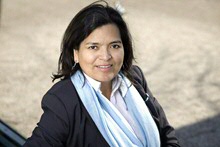ERC Grants awarded to four UG scientists
Four University of Groningen researchers have been awarded an ERC Starting Grant: Jana Hönke, Irma Mosquera-Valderrama, Panos Merkouris and Tina Kretschmer. The European Research Council (ERC) awards these personal grants of EUR 1.5 million to excellent researchers in order to stimulate groundbreaking research in Europe.

Jana Hönke (Faculty of Arts)
Investors from emerging powers challenge traditional theory and practice of international relations. Chinese and Brazilian companies are now the most important bilateral investors in Africa. They apply existing rules, but also introduce new practices of governance and business-society relations that compete with Western norms. However, the nature and impact of these emerging new practices is little understood. The new, 5-year INFRAGLOB project will research how models and experiences of actors from the Global South (i.e., Africa, Asia, Latin America) redefine the governance of economic hubs globally. The INFRAGLOB team will analyse the ideas driving Chinese and Brazilian management of large-scale port and mining projects, and conduct multi-sited ethnographic research in Mozambique, Tanzania, Brazil and China to establish how these concepts are enacted, negotiated and disregarded in practice. It will research how this is affected by transnational mobilisation and infrastructure controversies across Africa, Brazil and China. Finally, it will establish how these new actors and practices change existing attempts of globally regulating transnational business from the bottom-up. As such, this project will provide a unique understanding of how the Global South changes practices of governance and business-society relations in a multipolar world.
Contact: Jana Hönke

Irma Mosquera-Valderrama (Faculty of Law)
Dr Mosquera-Valderrama investigates the role of the OECD (Organisation for Economic Co-operation and Development) and the EU in international tax lawmaking, and aims to formulate conditions under which both developed and developing countries can adhere to a global tax governance model. Her project called
GLOBTAXGOV. A New Model of Global Governance in International Tax Law Making’
will assess the feasibility and legitimacy of the current model of global tax governance. The EU and OECD currently focus on substantive issues that, when implemented, will change the international tax architecture of developed and developing countries. Even though the initiatives aim to ensure that governments engage in fair competition and that multinationals pay their fair share, they have also generated tensions between developed and less-developed countries and between EU and non-EU countries. The tensions call for the articulation of a new framework of global tax governance that is based on fairness for all countries participating. Against this background, the project will assess the feasibility of the legal transplant of minimum standards into the tax systems of 12 countries.
Contact: Irma Mosquera-Valderrama, via Marije Cnossen

Panos Merkouris (Faculty of Law)
Dr Panos Merkouris’ project called ‘ TRICI-Law. The Rules of Interpretation of Customary International Law’ revolves around the rules of interpretation of customary international law (CIL). CIL, treaties and general principles are the main sources of international law. However, whereas for treaties rules of interpretation have been enshrined in the 1969 Vienna Convention on the Law of Treaties and continue to be the object of analysis and debate even today, the rules of interpretation of CIL have not been critically studied before. This is extremely problematic since not only is interpretation critical in almost every international judicial case, but is also one of the basic markers of the effectiveness and predictability of any legal system. By not knowing the rules that govern the interpretation of CIL, we end up playing a ‘game’ the rules of which are unknown, and by consequence predictability is far from guaranteed.
The aim of this project is to determine the existence and to examine the content of the rules that govern the process of interpretation of CIL and to shed light on how these rules differ from those governing the interpretation of treaties both across different fields of international law and through time.
Contact: Panos Merkouris

Tina Kretschmer (Faculty of Behavioural and Social Sciences)
We know from previous work that peer relationships in adolescence have consequences for psychological wellbeing in adulthood, but this project looks further than that. Dr Tina Kretschmer proposes that the consequences of peer experiences are of much greater significance for one's development. In this project she explores the transmission of peer experiences across social contexts by looking at how one's adult romantic relationships and friendships are affected by earlier peer experiences. Additionally she studies whether peer experiences are passed on across generations and affect one’s offspring via environmental, genetic, and epigenetic pathways. The results of this project will greatly improve our knowledge on the role of peers for social development.
Contact:
Tina Kretschmer
More about ERC
ERC supports talented young researchers in setting up a research team and starting an independent research project. The Advanced Grants are open to established academics of all nationalities and all ages. An ERC grant enables these researchers to start bold, groundbreaking research and thus open up new avenues in their field of study.
| Last modified: | 14 April 2020 3.57 p.m. |
More news
-
22 April 2024
Trump or no trump, that is the question
UG researchers Ritumbra Manuvie, Pieter de Wilde, and Lisa Gaufman look ahead to the elections in India, Europe, and the United States, respectively. This week: Lisa Gaufman.
-
15 April 2024
‘The European elections will be as boring as always’
UG researchers Ritumbra Manuvie, Pieter de Wilde, and Lisa Gaufman look ahead to the elections in India, Europe, and the United States, respectively. This week: Pieter de Wilde. He predicts that the European elections will be as boring as always.
-
09 April 2024
Kirsten van den Bosch: 'Connecting students with the work field really is achievable in every programme'
Dr Kirsten van den Bosch en her team won the Best Practice Award 2024 with their initiative to connect students with organizations to solve real problems within Academic Learning Communities.
